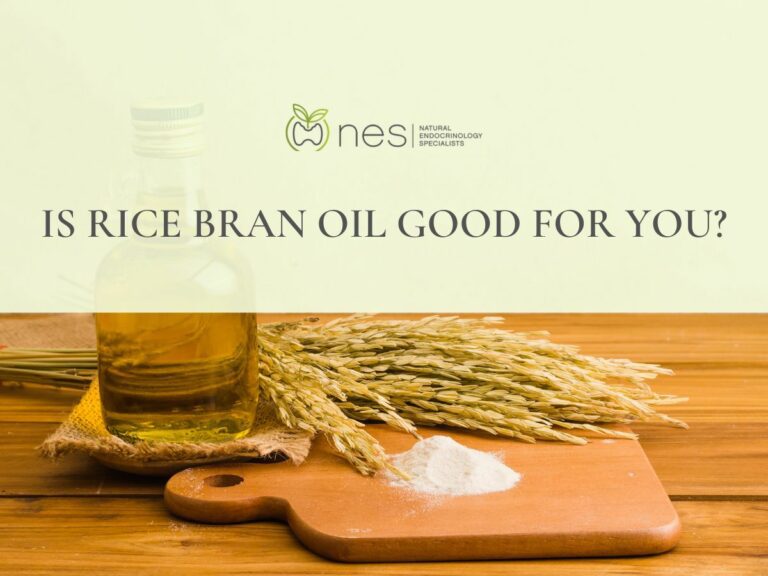There has been quite a bit of debate as to whether rice bran oil is good for you or not. The short answer is: in moderation. While rice bran oil has several benefits, its other properties may be a reason for concern if consumed in excess.
Rice bran oil is often used in cooking but has also been found useful for your skin and hair. Its also commonly found in cosmetics as its high in Vitamin E, making it quite moisturizing.
Rice bran oil is often used in cooking, as it doesn't have a pronounced taste and has a very high smoke point making it a good oil to use in frying. This comes with a caveat, however, because in general, the more refined an oil is, the higher its smoke point.
Other refined oils with high smoke points include vegetable oil, soybean oil, safflower oil, corn oil, and margarine. Generally, refined oils, including rice bran oil are high in omega-6 fatty acids, making them inflammatory.
About rice bran oil:
Rice bran oil is the oil that is extracted from the rice husk, also known as chaff, and germ which is the hard outer brown layer of rice.
The oil is removed from the chaff and germ and then refined to make rice bran oil. It has a smoke point of 232 C, making it ideal for frying and stir-frying.
Rice bran oil is commonly used in Asian countries for its cooking versatility.
What is the difference between omega-6 and omega-3 fatty acids?:
Omega-3 fatty acids are anti-inflammatory, healthy, unsaturated fats that can often be found in food. The three types of omega-3 fatty acids include:
- DHA (Docosahexanoic acid)
- EPA (Eicosapentaenoic acid)
- ALA (Alpha linolenic acid)
Research shows that omega-3 fats play an essential role in nerve, brain and eye development. In fact, omega-3 fats have been proven to help lower the risk of heart disease and improve immune system function. Other benefits of Omega-3 fatty acids include:
- Help fight anxiety & depression
- Benefit eyesight
- Reduce triglycerides
- Reduce blood produce
- Increase HDL (also known as good cholesterol)
- Cancer prevention
- Reduce inflammation
Foods rich in omega-3 fatty acids include:
- Fatty fish like salmon, sardines, mackerel, herring, trout, tuna
- Fish oil
- Sardines
- Flaxseeds
- Walnuts
- Soybeans
- Tofu
- Eggs
Omega-6 fatty acids are also unsaturated fatty acids that can also be found in our diet. Unlike Omega-3 fatty acids, Omega-6 fatty acids are pro-inflammatory.
That's not to say that omega-6 fatty acids should be avoided, however, it is best to aim for a ratio of 1:4 when it comes to omega-6 to omega-3 ratios. Too many omega-6 fatty acids have been shown to increase inflammation which can put you at risk for many chronic diseases.
Some research has shown that a high intake of omega-6 fatty acids has been linked to increased risk:
- Diabetes
- Insulin Resistance
- Obesity
- Cardiovascular Disease
- Leptin Resistance
- Increase risk for certain types of cancers like breast cancer
This isn't to say that omega-6 fatty acids should be entirely avoided though, as some inflammation is necessary as it can help protect our bodies from injury and infection.
So like most things, a little bit and in moderation may do a body some good.
The types of Omega-6 fatty acids include:
- Linoleic acid (LA)
- Arachidonic acid (ARA)
- Gamma linoleic acid (GLA)
- Conjugated linoleic acid (CLA)
Foods rich in omega-6 fatty acids may include:
- Corn
- Rice bran oil
- Safflower oil
- Sunflower oil
- Sesame oil
- Soybean oil
- Vegetable oils
- Meat, Poultry
- Eggs
- Peanuts
5 health benefits of rice bran oil?:
- May help reduce cholesterol
- Recent research shows that intake of rice bran oil may promote lower levels of total cholesterol and LDL cholesterol (which is deemed the bad cholesterol). Another study actually found that dietary intake of rice bran oil may raise good cholesterol (HDL) in men.
- Elevated smoke point
- An oils smoke point is the temperature when it starts to break down. When oils begin to break down, they oxidize and release free radicals which cause damage to your cells. This oxidative process can promote inflammation and disease. Depending on what temperature you're cooking, it's important to choose an appropriate oil that will not oxidize. For this reason, rice bran oil makes for appropriate option when stir-frying or frying dishes. A good alternative for rice bran oil, though, is avocado oil as it also has a high smoke point (271 C) and contains a higher percentage of monounsaturated fat and less saturated fat than rice bran oil. Because avocado oil has less saturated fat, it makes it a better option at keeping your cholesterol and triglycerides levels lower.
- Rich in Vitamin E
- Vitamin E is a fat-soluble vitamin and antioxidant that has been shown to act a free-radical scavenger and protect the skin. Acting as an antioxidant, Vitamin E when used topically is able to not only nourish and hydrate the skin but also fight ultraviolet damage to the skin. Vitamin E has been shown to provide benefits for:
- Acne
- Wound healing
- Uneven skin tone
- Dry skin
- RosaceaÂ
- Eczema
- Rice bran oils' rich Vitamin E content may also make it effective at preventing hair loss. Its antioxidant properties reduce oxidative stress and free radicals that could be contributing to hair loss.
- Oral HealthÂ
- Ever hear of oil pulling? The practice of oil pulling involves swishing oil in your mouth for 10 to 20 minutes. It has been found that daily oil pulling can:
- Reduce inflammation and improve the health of your gums (like preventing gingivitis, for example)
- Reduce risk of cavities
- Reduce bad breath (also known as halitosis)
- Kill harmful oral bacteria
- Whiten your teeth
Several different oils can be used for oil pulling, rice bran oil being one of them. Studies have shown that oil pulling with rice bran oil is an effective way of reducing bad breath and preventing tooth decay.
By taking proper care of your oral health, you can inadvertently help improve other conditions including infections, hormonal imbalances, diabetes, skin conditions, and more.
- Rich in monounsaturated fats
Literature suggests that monounsaturated fats are associated with lowered risk of cardiovascular disease and strokes as they can help reduce total cholesterol and LDL cholesterol levels. They may also help stabilize insulin and blood sugar, lowering your risk for type 2 diabetes.
Rice bran oil contains 5 grams of monounsaturated fats per serving (a serving being one tablespoon). It should be noted however that while rice bran oil does contain monounsaturated fats, it does also contain 5 grams of polyunsaturated fat per serving.
A high intake of polyunsaturated fats has been associated with an increased risk for inflammation, atherosclerosis, diabetes, cancer, and asthma.
What are other good alternative oils to use?:
As mentioned, rice bran oil can provide some health benefits, however, when used in excess can have detrimental health consequences.
For this reason, it is important to be aware of other, more healthful alternatives that you can use in your cooking including:
- Olive oil
- Avocado oil
- Coconut oil
- Ghee
- Grassfed Butter
- Flaxseed oil
Be sure to assess the smoke point of these oils to see which are best to cook with versus which are better to merely use raw. You can also request that your healthcare practitioner run an OmegaCheck Panel to assess your Omega 3/6 Ratio.
Sources:
https://www.ncbi.nlm.nih.gov/pmc/articles/PMC4808858/
https://pubmed.ncbi.nlm.nih.gov/27311126/
https://www.ncbi.nlm.nih.gov/pmc/articles/PMC4976416/#:~:text=Vitamin%20E%20is%20an%20important,as%20a%20free%2Dradical%20scavenger.
https://www.ncbi.nlm.nih.gov/pmc/articles/PMC3819075/
https://pubmed.ncbi.nlm.nih.gov/27966509/
https://www.ncbi.nlm.nih.gov/pmc/articles/PMC5654187/
https://www.ncbi.nlm.nih.gov/pmc/articles/PMC5315033/
https://pubmed.ncbi.nlm.nih.gov/12052487/






